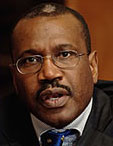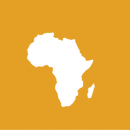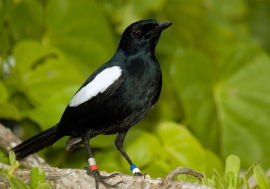Africa Watch
SOUTH-SOUTH
Africa and South America expand relations
Africa and a dozen South American countries are set for greater cooperation following the first Africa-South America summit, held in Abuja, Nigeria, in November. More than 900 delegates, including numerous heads of state, came from 53 African countries and 12 South American nations (Argentina, Bolivia, Brazil, Chile, Colombia, Guyana, Paraguay, Peru, Suriname, Ecuador, Uruguay and Venezuela).
The representatives adopted a declaration paving the way for deeper trade and investment relations and the establishment of an Africa-South America Bank to fund regional infrastructure projects. The two regions also agreed to adopt common negotiating positions and coordinate strategies at the World Trade Organization.
Under the summit’s Abuja Resolution, the two regions will set up a Forum of Cooperation to meet once every two years to discuss bilateral relations. Already, Venezuela has nearly doubled the number of embassies in Africa over the last few years and is now represented in 47 countries, while trade between Brazil and the continent has grown from $5 bn in 2002 to $15 bn in 2006. The two regions will hold their second summit in Caracas, Venezuela, in 2009.
CLIMATE CHANGE
Water insecurity threatens farmers
Climate change threatens to intensify water insecurity on an unparalleled scale, with parts of sub-Saharan Africa facing potential crop losses of up to 25 per cent by 2050 due to climate-induced weather patterns, warns the latest Human Development Report. The report, released by the UN Development Programme (UNDP) in November, finds that even with an agreement to reduce carbon emissions through international cooperation, dangerous climate change is now almost inevitable. The most severe consequences will be experienced by countries and people who bear little responsibility for the problem, it notes. Agriculture will be hit the hardest. Because of changing rainfall patterns, malnutrition could increase by 15-26 per cent by 2050.
Already, lack of water is ravaging many parts of Africa, UNDP reports. In northeast Kenya, some 3 million people risk starvation from drought, violent clashes between farmers and pastoralists are increasingly common and the country’s gross domestic product fell 16 per cent between 1998 and 2000 due to drought.
Calling for immediate action, the report’s lead author, Mr. Kevin Watkins, argues that the world does not lack “the financial resources, the technology or the ingenuity to consign the water and sanitation crisis to its proper place in history books. This crisis is the product of policies and priorities that can be changed, and of a complacency that can be overcome.”
TRADE
African producers get US boost
In December, the US Congress approved a trade package under the African Growth and Opportunity Act (AGOA) which may help avert the loss of thousands of jobs on the continent. AGOA, first passed in 2000, provides duty-free access to the US market for many African products. Supplementing and extending those provisions, the House of Representatives passed the AGOA Investment Incentive Act 2006 to help producers in sub-Saharan Africa better withstand heightened competitive pressures from China following the end of quotas on textile and clothing trade in 2004 (see Africa Renewal, April 2006).
The new measure includes the extension, until 2012, of the “third-country fabric provision,” which was previously set to expire in 2007. That extension allows African clothing manufacturers to use raw materials from countries other than their own and still benefit from preferential access into the US. Kenya’s representative in the US, Ambassador Peter Ogego, says this may save thousands of jobs in his country alone. Kenya created 30,000 textile jobs since AGOA was enacted, and would have lost its US preferences had the provision not been extended, since it does not produce its own fabric. The extension “will give us enough time as a country to develop our cotton sector,” said Mr. Ogego.
The US is currently reforming its trade preference system for sub-Saharan Africa. Following the adoption of AGOA, clothing and textile imports from Africa into the US grew significantly, but dropped 30 per cent after quotas for the textile trade were lifted by international agreement at the end of 2004.
Appointments
 Photograph: UN Photo / Eskinder Debebe
Photograph: UN Photo / Eskinder DebebeDr. Margaret Chan of Hong Kong has been appointed director-general of the World Health Organization by the agency’s 193-nation governing body, the World Health Assembly. Prior to her new appointment, Dr. Chan was WHO’s assistant director-general for communicable diseases and the director-general’s representative for pandemic influenza. She also served as director of health in Hong Kong, where she led the territory’s response to H5N1 avian influenza and severe acute respiratory syndrome (SARS). Her term of office runs until June 2012. She becomes the first person from China to lead a UN agency.
 Photograph: ITU / J.M. Ferre
Photograph: ITU / J.M. FerreThe International Telecommunications Union (ITU) in November elected Mr. Hamadoun Touré, a citizen of Mali, as its secretary-general. Mr. Touré, who was formerly the director of ITU’s Telecommunications Development Bureau, will serve in the position for four years. He has more than 20 years of experience in telecommunications, including in management positions in large companies such as INTELSAT and ICO Global Communications. Mr. Touré began his career in 1979 in Mali’s Office of Posts and Telecommunications.













